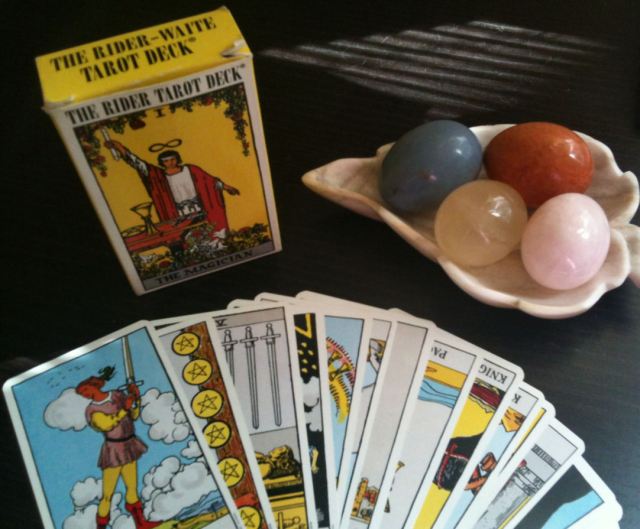
I am grateful that I did not access the Internet during my formative years of learning tarot. Communities of self-proclaimed advanced tarot practitioners have brought into being the supercilious notion that the Rider-Waite or Rider Waite Smith (RWS) tarot deck is a “beginner’s deck” and that a high level practitioner will have moved beyond the RWS into another more specialized deck.
What hooey.
These practitioners need to revisit the RWS and re-evaluate for themselves how well they truly understand the RWS. Are they really using the symbology contained in the deck to its full extent? Do they understand the elemental influences, astronomical, seasonal, and the nuances of every last bird in the sky, leaf, and blade of grass?
As I have said, as of the present there are three prevailing tarot deck systems. The Marseille with the pip cards, the RWS, and the Thoth. The three are very different from one another and every practitioner should be fluent with reading all three. From there, you will find that you gravitate more toward one of those three. That will most likely become your primary reading deck.
The three systems have inspired numerous contemporary derivative decks. These decks are generally based on one of the foregoing three systems, or are a hybrid. Most of these derivative decks are created to reconcile an omission in one of the three main systems. A basic example of that are the fancy, beautifully illustrated RWS decks that are aesthetically more pleasing to the eye than the original RWS. There are decks that attempt to better flesh out the interpretive methods of the Golden Dawn. Others fuse the foundation of the tarot with imagery that is more specific to a particular faith, philosophy, or culture. All of these decks are legitimate reading decks and if you find yourself connecting to one more so than the RWS, then that’s really great for you.
However, it does not mean you’re now more advanced. People start with the RWS not because it’s a beginner’s deck, but because it is a traditional system. The Marseille is another traditional system, but not everyone has developed and honed their intuitive abilities to a point where they can read pip cards meaningfully. The RWS is like Tchaikovsky’s Violin Concerto in D Major while the Thoth is like Stravinsky and the classical musician will have attempted to master both, but neither one is hardly considered “beginner” stuff. Playing Vyacheslav Artyomov or Gheorghi Arnaoudov doesn’t make you more advanced than the fellow working on the Tchaikovsky piece.
So please do not listen to the snobbery, my dear RWS reader. If that was your first reading deck and still remains your only reading deck, then that is what works for you. That shouldn’t even be said in a patronizing way. Seriously. RWS is an incredibly complex deck and anyone who thinks it’s the training wheels of tarot is someone who still has a beginner, rudimentary understanding of the study.

I absolutely love the rider waite deck. It was the first i learned on and even though peopel do refer to it as a beginners deck i like the fact I not only got to learn on it but mastered it before i moved on to something else. I always find myself ( if i purchase a new deck) going back to a rider waite like deck as the Steel Wizard or the new tarot illuminati deck.
LikeLike
This is a really good blog post. You made so many good points. Thank you for writing it.
I would go as far to say that it’s one of the more complex decks ever published. I have been reading Tarot for twenty years and I am still finding details in the symbolism. I’ll be reading something on the Internet and be like “Oh man, I’ve never noticed that before.”
The idea that the Rider Waite is a beginners deck probably comes from the fact that it’s the one deck that was most available to beginners before the Internet. Now with so many decks available, it should be classed as an advanced deck. Arthur Edward Waite was a ceremonial magician, and his depth of knowledge is reflected in the deck. If one wants to get the fullest understanding of the deck, one must be familiar with numerology, astrology, Kabbalah, the Hebrew alphabet, and at least a rudimentary understanding of magick and witchcraft (for the corresponding elements). The Rider-Waite is amazing how subtle and intricate all the symbolism is interwoven into each card.
A true beginners deck will have easy-to-read symbolism and a user-friendly style that easily fits into any spiritual path. If anyone wants to find a beginners deck, there’s hundreds of them ironically patterned AFTER the Rider Waite, but not the other way around.
LikeLike
I really couldn’t have said it better, Chellyn! I’m also of the belief that you need to be familiar with numerology, astrology, Kabbalah, the Hebrew alphabet, the Golden Dawn tradition, and ceremonial magic to get the most out of the symbolism in the Rider Waite. In fact, I’ve always found it interesting how many beginners are in fact turned off by the Rider Waite, but then after advancing in their practice, will go back and see the Rider Waite in an entirely new light. That must say something about the deck!
LikeLike